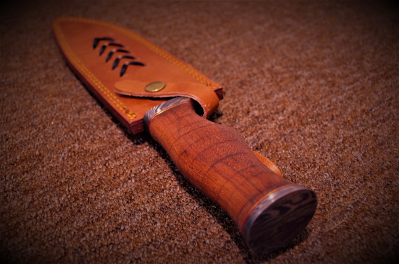Beyond the Kitchen: A Closer Look At Damascus Knives
2023.10.09
Damascus knives trace their storied origins to ancient civilizations, particularly the regions surrounding Damascus, the capital city of modern-day Syria. Named for this historic city, which was a central hub of trade and craftsmanship in the ancient world, these knives were once revered as the weapon of choice for warriors, owing to the resilience and sharpness of the Damascus steel. This unique metal is characterized by its incredible patterns, a result of melding different types of steel. These wavy, water-like designs are not just aesthetically pleasing; they are a testament to the steel's layered construction that grants it unparalleled strength and flexibility.
In the modern age, while the legend of the Damascus blade as a weapon lives on, its prominence has been remarkably reimagined in the culinary world. Renowned chefs and culinary aficionados across the globe now covet Damascus knives, not just for their beauty but for their exceptional sharpness and edge retention. The shift from battlefield to kitchen speaks volumes about the versatility and enduring appeal of Damascus steel, seamlessly marrying form and function in each blade's creation. Damascus knives aren’t just limited to the kitchen in today’s world, as they serve a variety of purposes. Regardless of their function, it is imperative to properly care and maintain these special knives.

Damascus Knives in Historical Context
The historical roots of Damascus knives trace back to ancient civilizations in the Middle East, most notably the city of Damascus, which was a bustling trade center in present-day Syria. The city became synonymous with the production of these exceptional blades, which were crafted using a unique technique that involved forging together multiple layers of different types of steel. This method not only imbued the steel with its characteristic wavy patterns but also enhanced its strength, flexibility, and edge retention. The result was a blade that was remarkably superior to others of its time, making it a coveted possession among warriors, traders, and royalty alike.
Over the centuries, the fame of Damascus steel spread far and wide, reaching regions such as South Asia and Europe. Tales of Damascus swords and blades that could slice through a rifle barrel or cut a strand of hair floating in the wind became legendary. These blades were believed to be so sharp and durable that they could cut through lesser quality swords, making them highly sought after by warriors and conquerors. With such renowned prowess, they naturally found mention in various historical texts, epic tales, and folklore.
Beyond Culinary Delights
Damascus knives have proven their mettle in a plethora of applications. In outdoor adventures, for instance, the unparalleled sharpness and durability of Damascus steel have made it the choice for many hunting knives. Such knives are revered not just for their cutting efficiency, but also for their resilience against the elements. Whether it's skinning game in the wild, fileting a fresh catch during a fishing expedition, or simply performing regular campsite chores, a Damascus knife stands out as a reliable companion. Its ability to retain an edge longer and resist wear makes it invaluable in survival scenarios where precision and tool longevity can make all the difference.
In everyday scenarios the versatility of Damascus knives is evident. Artists and craft enthusiasts often lean towards these blades for tasks that require extreme precision, such as paper cutting or delicate woodwork. Gardeners appreciate them for their prowess in making clean cuts, essential for plant health and propagation. Even in routine home projects, such as DIY tasks or simple repairs, the adaptability of Damascus steel proves its worth. Far from being limited to culinary masterpieces, these knives have proven themselves useful in daily life, providing both utility and a touch of artistry in mundane tasks.
Safety, Maintenance, and Care
The exceptional quality and craftsmanship behind Damascus knives demand an equal measure of care and attention to ensure their longevity and performance. Storing these knives properly is paramount. When not in use, they should be kept in a dry environment, preferably in a knife block or magnetic strip, away from other utensils that might cause unnecessary abrasions. It's also recommended to hand wash these knives, as dishwashers can be too abrasive and the detergents may cause corrosion. After washing, it's essential to dry the blade immediately with a soft cloth to prevent any possibility of rusting, given the high carbon content in many Damascus blades.
Sharpening a Damascus knife requires a specific approach to maintain its keen edge. While these knives retain their sharpness longer than many other blades, periodic honing using a honing rod can help realign the edge and keep it razor-sharp. For full sharpening, it's best to use water stones or whetstones, starting with a coarser grit and moving to a finer one for a polished edge. When sharpening, consistent angles and strokes are vital to ensure even sharpening across the blade. Beyond sharpening, occasional oiling using mineral oil can help protect the blade from moisture and maintain its lustrous appearance.
Damascus knives, with their rich history and unparalleled craftsmanship, transcend their popular culinary role, finding relevance in myriad applications ranging from outdoor adventures to everyday tasks. Their blend of artistry and functionality speaks to both their historical significance and their modern-day utility. With the right care, they can be passed down from generation to generation.
More Articles
Copyright © Fooyoh.com All rights reserved.